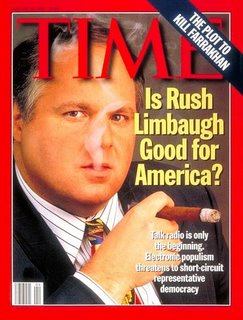 It seems Rush Limbaugh has created a monster. Say whatever you want about him, his influence on the conservative movement is second only to William F. Buckley or even economists like Milton Friedman. While I have no doubt that many 20-something bloggers regard Limbaugh as a relic, it is hard to deny that he was the tipping point for an awful lot of college-aged kids who were confused as to what politics was all about, and who desperately needed someone, anyone, to explain what they felt already: that conservatism was the way to go. Over the years, it seems this generation of Postmoderns has outgrown Rush, and have even begun to question the master himself, most pointedly in the current debate over Rush’s criticism of Glenn Reynold’s “pre-mortem” post on Instapundit.
It seems Rush Limbaugh has created a monster. Say whatever you want about him, his influence on the conservative movement is second only to William F. Buckley or even economists like Milton Friedman. While I have no doubt that many 20-something bloggers regard Limbaugh as a relic, it is hard to deny that he was the tipping point for an awful lot of college-aged kids who were confused as to what politics was all about, and who desperately needed someone, anyone, to explain what they felt already: that conservatism was the way to go. Over the years, it seems this generation of Postmoderns has outgrown Rush, and have even begun to question the master himself, most pointedly in the current debate over Rush’s criticism of Glenn Reynold’s “pre-mortem” post on Instapundit. The debate seems to paint Rush in a very Modern corner, that is, a corner that forces him to react like a cat trapped against a pack of dogs. He insists that a Democrat victory in November would mean catastrophe on issues like the War on Terror, tax cuts and the Supreme Court. He is more right than many know-it-all bloggers (like myself) want to give him credit for. But he is the victim, I think, of being perceived as a Modernist thinker in a Postmodern world. What we bloggers cannot forget, even at the peril of becoming the history-forgetting liberals we often deplore, is that Rush continues to have an extremely important seat at the conservative table. His style is often repetitive, and he doesn’t often go to the level of sophistication Gen Yers would like. And his portrayal of Democrats=bad/Republicans=good is limiting, though he is more critical of Republicans than his detractors give him credit for. But for what he does, it is hard to ask for a better expositor of conservatism and capitalism in mass media than Limbaugh.
My level of interest is the bigger sway here, which is that the conservative movement may be turning in on itself. Like a dragon who finally recognizes his own strength, the conservative movement has become exactly what you would expect of conservatives: disloyal, skeptical, and self-critical. Each one of these characteristics is in what defines conservatism:
They are disloyal to central authority, not trusting it and the power they believe will eventually become corrupted. The core conservative understanding of the free market is that it is voluntary, and that information is best disseminated through this process, not through one source from the top. The same is true in the world of ideas.
They are skeptical of one train of thought that is seen as the final arbiter of truth, and even moreso of one person espousing that train of thought. It is this skepticism that fosters a belief in limited government, the free market, etc.
Conservatives, especially Postmodern conservatives, are self-critical. They don’t necessarily even trust each other when it comes to ideas. The reason there is fear of conservatives sitting out the election is because they can debate the major issues of the day, and some even consider a wrong conservative a worse enemy than a liberal.
As far as what to do this term, I tend to agree with Rush on principle that you can’t win by losing. Although everything within me wants Republicans to pay for such a poor showing over the past four years. The person we should be genuinely upset with, however, is Bush. Aside from the War on Terror, he has been Bush the Disappointment, not Bush the Conservative we voted for. His severe lack of leadership has left conservatives in both houses of Congress without direction. Let’s face it: he wasn’t what we thought he was. We were all duped to a large degree. Losing the houses won’t fix it. Neither will nominating McCain. Long term, it seems likely that a conservative third party may be on the horizon, and these growing pain in the conservative movement may be its impetus. Looking back, we may be on the verge of something very big. That’s at least a little exciting.

No comments:
Post a Comment